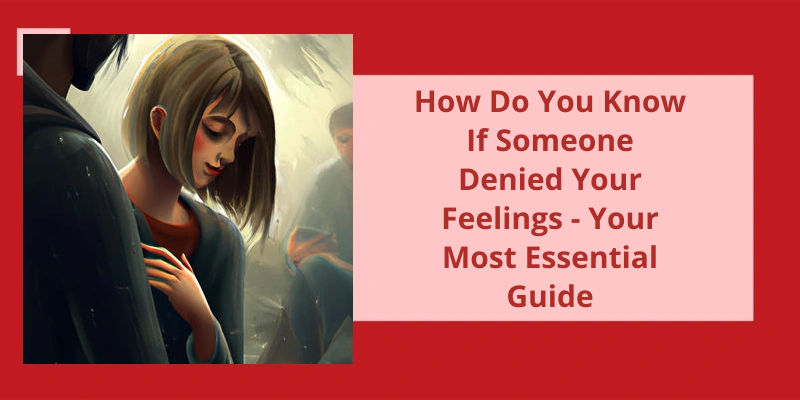Navigating the complex web of human emotions can be a challenging endeavor, filled with both joy and pain. However, when we share our feelings with someone, we hope for validation and understanding. Unfortunately, not everyone possesses the ability to acknowledge and respect the emotions of others. In this comprehensive guide, we will unravel the enigma of recognizing when someone denies your feelings. Whether it's a dismissive remark, an invalidating gesture, or a complete disregard for your emotional state, understanding the signs of denial can help you navigate relationships more effectively and protect your own emotional well-being. This essential guide will equip you with the tools to identify when your feelings are being disregarded and provide strategies for addressing this issue assertively while maintaining your own emotional integrity. By honing this awareness, you’ll be empowered to build healthier relationships based on mutual respect and emotional support.
What Are the Characteristics of Denial?
Denial is a complex defense mechanism that individuals may employ when confronted with uncomfortable or distressing emotions. It can manifest in various ways and hinder personal growth and relationships. One common characteristic of denial is the refusal to acknowledge or talk about the problem at hand. This can be seen when individuals avoid conversations related to their feelings or dismiss the concerns of others.
Another sign of denial is the tendency to justify ones behavior. Instead of accepting responsibility for their actions, individuals in denial may find ways to rationalize or excuse their choices. They may downplay the impact of their behavior or convince themselves that they’d no other option.
Blaming others or external factors is another common characteristic of denial. This defense mechanism allows individuals to shift the blame away from themselves and onto someone or something else. By attributing the problem to external forces, individuals can avoid confronting their own emotions or taking accountability for their actions.
Persistence in a behavior despite negative consequences is also indicative of denial. This can occur when individuals continue engaging in harmful or self-destructive patterns, even when it causes significant harm to themselves or others. They may convince themselves that the negative outcomes are unrelated to their behavior or that they’ve control over the situation.
Promising to address the problem in the future is another trait often observed in denial. Individuals in denial may make empty promises or vague commitments to change, but rarely take concrete steps to address the underlying issues. This allows them to momentarily appease others or convince themselves that they’re working towards a solution, without actually confronting their feelings.
Recognizing these signs of denial can be crucial in understanding whether someone is denying your feelings. By being aware of these characteristics, you can navigate conversations and relationships more effectively, promoting open and honest communication.
It’s a common defense mechanism for individuals to be in denial about their feelings, as they seek to shield themselves from emotional distress. However, this approach can unknowingly lead to detrimental consequences, with self-harm being one such unfortunate outcome. Denying the existence of challenging emotions doesn’t eradicate them; in fact, it’s an insidious impact on one’s subconscious and overall well-being.
Can Someone Be in Denial About Their Feelings?
In fact, it often exacerbates the situation, leading to more intense and prolonged feelings of distress. Denying your feelings can have serious consequences for your mental and emotional well-being. It can also strain your relationships with others, as they may sense that something is off but not understand why.
Denial is a defense mechanism that we use to protect ourselves from emotional pain. It’s a way of avoiding uncomfortable or distressing feelings that we may not be ready or willing to confront.
You’re telling yourself that your emotions aren’t valid or important. This can have a profound impact on your self-esteem and self-worth. It can lead to feelings of guilt, shame, and inadequacy.
If you refuse to acknowledge your emotions, you’re less likely to reach out for assistance or therapy. This can hinder your ability to effectively cope with and manage your feelings.
When you deny that you’re experiencing difficult emotions, you may turn to harmful coping mechanisms to numb or distract yourself from the pain. This can lead to a vicious cycle of self-destructive behaviors and further exacerbate your emotional distress.
They may listen attentively to your stories, provide support, and show interest in your life, but when it comes to expressing their own emotions, they remain tight-lipped. This can make it difficult to gauge their true feelings, leaving you wondering if they’re denying their emotions for you.
How Do You Know if Someone Is Denying Their Feelings?
They might refrain from expressing their own opinions or sharing their inner thoughts, often deferring to your needs and desires. This behavior can be a subtle indication that they’re denying their own feelings for fear of rejection or vulnerability. They choose to prioritize your happiness over their own, even if it means suppressing their emotions.
Another telltale sign of someone denying their feelings is their tendency to avoid certain topics or conversations that could potentially unveil their true emotions. They may divert discussions towards safer subjects or quickly change the subject when things become too personal or intimate. This avoidance can be an attempt to guard themselves from exposing their true feelings and to maintain a sense of distance.
In addition, someone who denies their feelings may exhibit passive-aggressive behavior as a form of indirect communication. They might make snide remarks or use subtle sarcasm to express their true emotions without directly admitting to them. This passive-aggressive attitude serves as a defense mechanism, allowing them to maintain a facade of indifference while still expressing their hidden emotions in a subtle manner.
Furthermore, they might display inconsistent behavior, giving mixed signals that often leave you confused about their true feelings. They might show moments of vulnerability or affection towards you, only to withdraw and distance themselves shortly afterward. This inconsistency is a result of their internal struggle to deny their feelings, causing them to oscillate between moments of genuine emotion and a desire to maintain emotional distance.
Signs and Consequences of Denying One’s Feelings
- Emotional suppression
- Physical symptoms
- Difficulty forming meaningful relationships
- Inability to communicate effectively
- Mental health issues
- Lack of self-awareness
- Increased stress levels
- Unresolved conflicts
- Negative impact on overall well-being
- Limited personal growth
Source: What’re signs your guy friend is in denial about his …
Now, let’s delve into the subtle signs that someone may be in denial about their feelings for you. While it can be challenging to decipher these signals, certain patterns may indicate their underlying emotions. Keep an eye out for these five indicators that suggest someone may be denying their true affection for you.
How Do You Tell if Someone Is in Denial About Liking You?
When it comes to deciphering if someone is in denial about liking you, there are a few signs to look out for. One key indicator is when they become easily jealous. Jealousy can be a clear signal that someone has developed deeper feelings, but they may be denying it to themselves. Pay attention to any hints of jealousy or possessiveness they display when you interact with others.
Another sign to consider is when someone flirts with you, but doesn’t follow through. They may engage in playful banter or drop subtle hints, but when it comes to taking the next step, they retreat or avoid any further action. This could be a way of protecting themselves from fully acknowledging their feelings.
Mixed signals can also be a strong indication of denial. They may say one thing while their actions speak another, leaving you feeling confused and unsure of their true intentions. This can be frustrating and leave you questioning whether their emotions are genuine or if theyre simply denying their true feelings.
Pay attention to how they communicate. If someone consistently speaks in parables or cryptic statements, it could be a defense mechanism to avoid directly expressing their feelings. By talking in riddles, they can distance themselves from the vulnerability that comes with confessing their emotions.
Lastly, listen for talk about “what if” scenarios. When someone repeatedly discusses hypothetical situations involving the two of you, it could be a way for them to explore their feelings without fully admitting them. They might be testing the waters or seeking reassurance before acknowledging their emotions.
Identifying signs of denial in someone who may have feelings for you can be challenging. Look out for jealousy, flirting without follow-through, mixed signals, cryptic communication, and conversations centered around hypothetical scenarios. Remember, every individual is unique, and these signs should be considered in conjunction with other aspects of their behavior and interactions with you.
Emotional Detachment: Discuss How Individuals in Denial May Try to Distance Themselves Emotionally by Avoiding Intimate or Deep Conversations.
Emotional detachment refers to the tendency of individuals in denial to distance themselves emotionally from others by avoiding intimate or deep conversations. When someone denies another person’s feelings, they might choose to detach themselves emotionally in order to avoid acknowledging or addressing those feelings.
One of the common dilemmas people face is whether it’s detrimental to deny their feelings towards someone. While suppressing emotions may appear to be an effective way to circumvent potential conflict and distress, it ultimately leads to denying one’s own genuine experiences. Nevertheless, mastering the art of authentic emotional expression can be challenging, prompting the suggestion that seeking assistance from a therapist can prove invaluable.
Is It Bad to Deny Your Feelings for Someone?
Hiding or denying your feelings for someone can have negative consequences, both for yourself and for your relationships. When you deny or suppress your feelings, you’re essentially invalidating your own experiences and emotions. This can lead to feelings of confusion, frustration, and even resentment. By not expressing your true emotions, you may also miss out on opportunities for personal and relational development. When you deny your feelings for someone, you may also be denying the opportunity for deeper connection and understanding with that person. It’s important to recognize and honor your feelings, as they’re valid and important. This isn’t to say that you should always act on every feeling, but acknowledging and expressing them can help you gain clarity and understand yourself better. Seeking guidance from a therapist can provide you with tools and strategies to navigate your emotions and communicate them effectively. A therapist can also help you explore any underlying fears or concerns that may be contributing to your tendency to deny or hide your feelings. Ultimately, learning to express your emotions authentically can lead to healthier relationships and a more fulfilling life.
Conclusion
In conclusion, understanding whether someone has denied your feelings can be a complex and nuanced process. It requires careful observation of their behavior, communication patterns, and empathy towards your emotions. While there may not always be clear-cut signs, certain indicators such as dismissive remarks, lack of validation, or avoidance can suggest that your feelings are being denied. However, it’s important to remember that individuals may have different ways of expressing their support or may be unaware of the impact their actions have on your emotions. Open and honest communication, setting boundaries, and seeking professional help if needed can be valuable tools in navigating these situations. Ultimately, prioritizing your own mental well-being and surrounding yourself with people who genuinely validate and respect your feelings is essential for emotional growth and healthy relationships.






